ATPPSY401A: Psychology Essay - Psychodynamic, Behavioral, Cognitive
VerifiedAdded on 2022/09/18
|7
|1329
|26
Essay
AI Summary
This essay provides an overview of three key approaches in psychology: psychodynamic, behavioral, and cognitive. It begins by discussing the psychodynamic approach, rooted in the work of Sigmund Freud, emphasizing the role of the unconscious mind and childhood experiences in shaping personality. The essay then delves into the concepts of behaviorism, focusing on observable behaviors and environmental influences, and cognitive psychology, which examines mental processes like attention and memory. The strengths and weaknesses of each approach are analyzed, highlighting the impact of childhood experiences, the importance of thought processes, and the limitations of each perspective. The essay concludes by emphasizing the value of psychology in understanding human behavior and the potential for future research and treatment approaches.
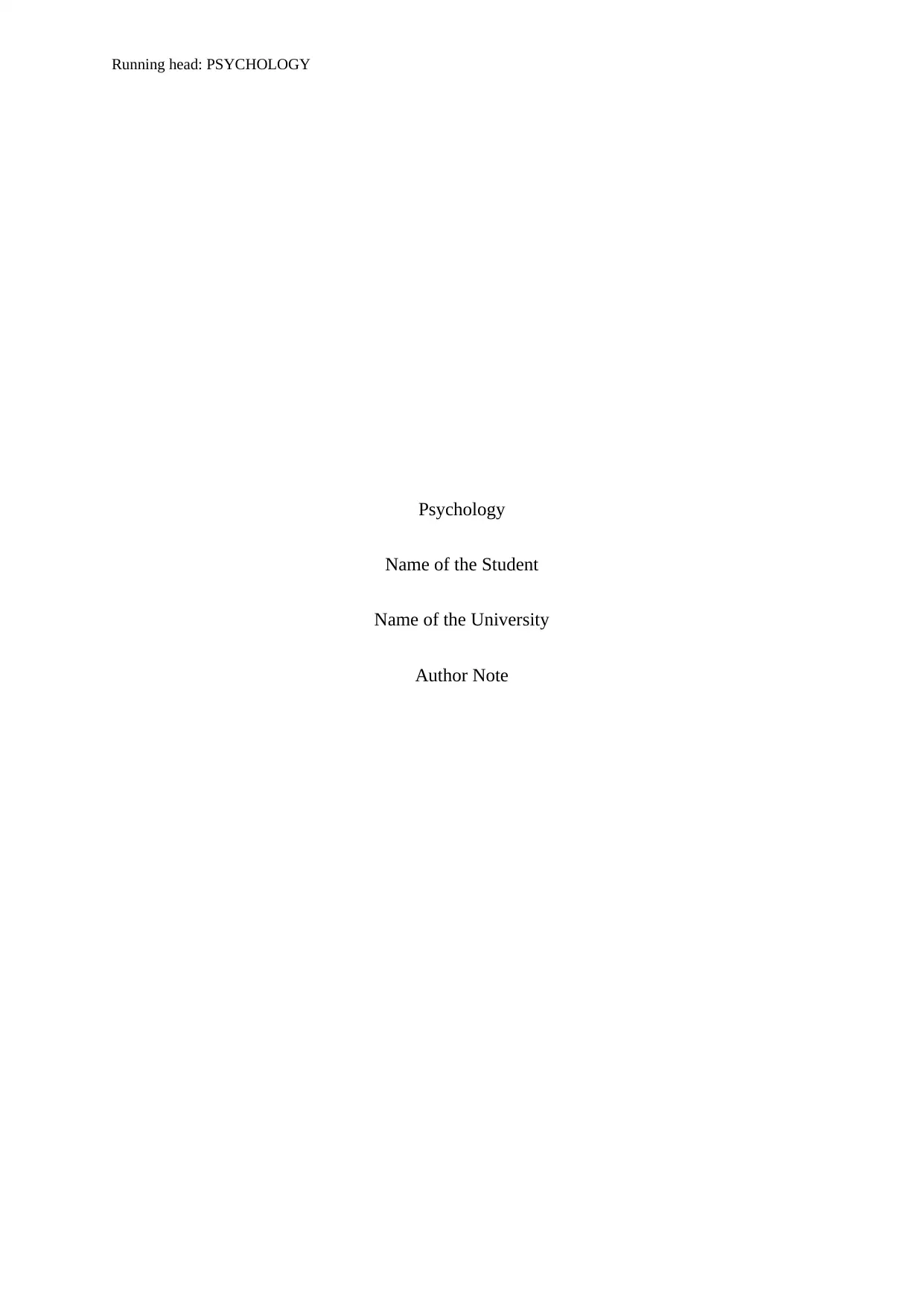
Running head: PSYCHOLOGY
Psychology
Name of the Student
Name of the University
Author Note
Psychology
Name of the Student
Name of the University
Author Note
Paraphrase This Document
Need a fresh take? Get an instant paraphrase of this document with our AI Paraphraser
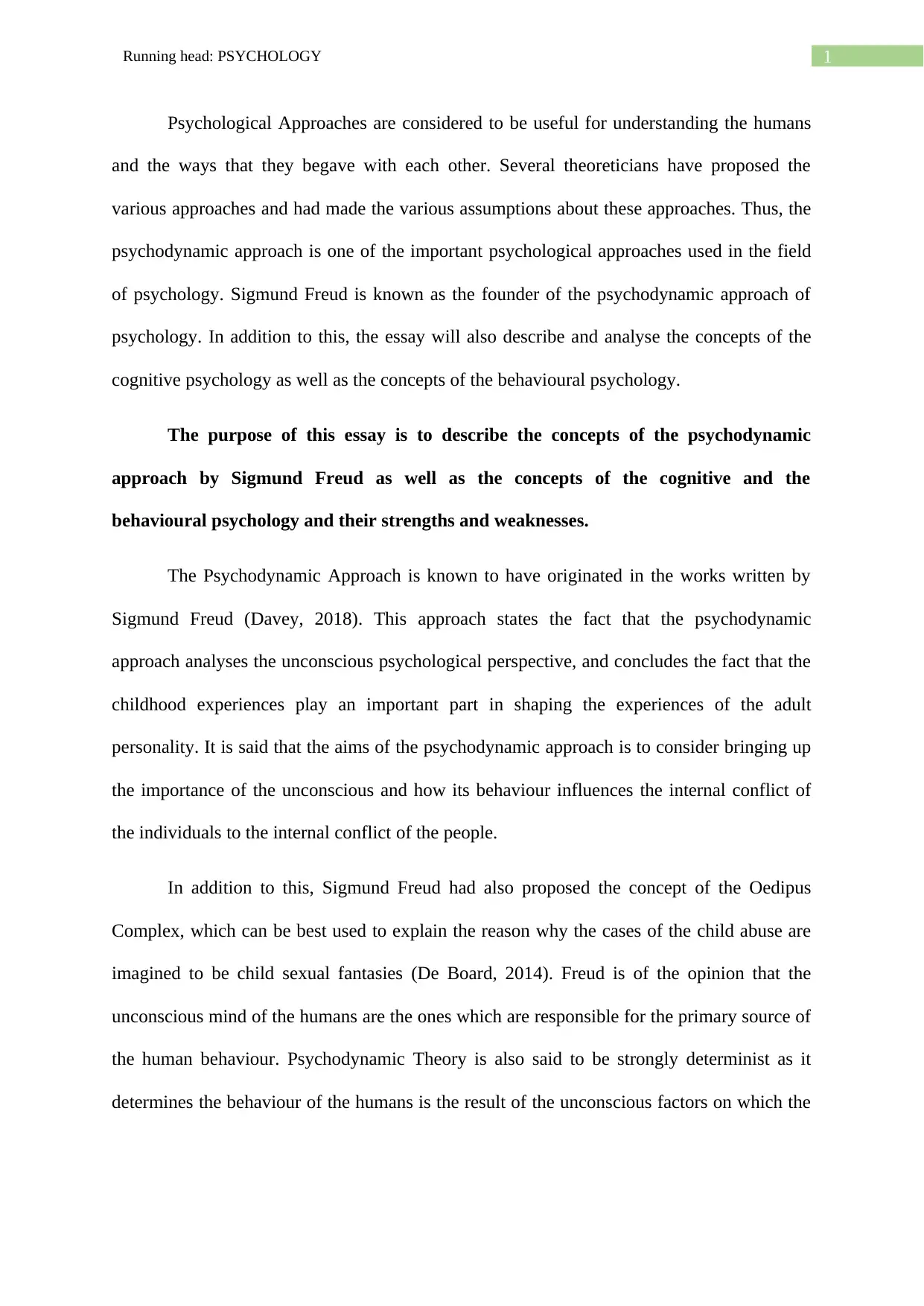
1Running head: PSYCHOLOGY
Psychological Approaches are considered to be useful for understanding the humans
and the ways that they begave with each other. Several theoreticians have proposed the
various approaches and had made the various assumptions about these approaches. Thus, the
psychodynamic approach is one of the important psychological approaches used in the field
of psychology. Sigmund Freud is known as the founder of the psychodynamic approach of
psychology. In addition to this, the essay will also describe and analyse the concepts of the
cognitive psychology as well as the concepts of the behavioural psychology.
The purpose of this essay is to describe the concepts of the psychodynamic
approach by Sigmund Freud as well as the concepts of the cognitive and the
behavioural psychology and their strengths and weaknesses.
The Psychodynamic Approach is known to have originated in the works written by
Sigmund Freud (Davey, 2018). This approach states the fact that the psychodynamic
approach analyses the unconscious psychological perspective, and concludes the fact that the
childhood experiences play an important part in shaping the experiences of the adult
personality. It is said that the aims of the psychodynamic approach is to consider bringing up
the importance of the unconscious and how its behaviour influences the internal conflict of
the individuals to the internal conflict of the people.
In addition to this, Sigmund Freud had also proposed the concept of the Oedipus
Complex, which can be best used to explain the reason why the cases of the child abuse are
imagined to be child sexual fantasies (De Board, 2014). Freud is of the opinion that the
unconscious mind of the humans are the ones which are responsible for the primary source of
the human behaviour. Psychodynamic Theory is also said to be strongly determinist as it
determines the behaviour of the humans is the result of the unconscious factors on which the
Psychological Approaches are considered to be useful for understanding the humans
and the ways that they begave with each other. Several theoreticians have proposed the
various approaches and had made the various assumptions about these approaches. Thus, the
psychodynamic approach is one of the important psychological approaches used in the field
of psychology. Sigmund Freud is known as the founder of the psychodynamic approach of
psychology. In addition to this, the essay will also describe and analyse the concepts of the
cognitive psychology as well as the concepts of the behavioural psychology.
The purpose of this essay is to describe the concepts of the psychodynamic
approach by Sigmund Freud as well as the concepts of the cognitive and the
behavioural psychology and their strengths and weaknesses.
The Psychodynamic Approach is known to have originated in the works written by
Sigmund Freud (Davey, 2018). This approach states the fact that the psychodynamic
approach analyses the unconscious psychological perspective, and concludes the fact that the
childhood experiences play an important part in shaping the experiences of the adult
personality. It is said that the aims of the psychodynamic approach is to consider bringing up
the importance of the unconscious and how its behaviour influences the internal conflict of
the individuals to the internal conflict of the people.
In addition to this, Sigmund Freud had also proposed the concept of the Oedipus
Complex, which can be best used to explain the reason why the cases of the child abuse are
imagined to be child sexual fantasies (De Board, 2014). Freud is of the opinion that the
unconscious mind of the humans are the ones which are responsible for the primary source of
the human behaviour. Psychodynamic Theory is also said to be strongly determinist as it
determines the behaviour of the humans is the result of the unconscious factors on which the
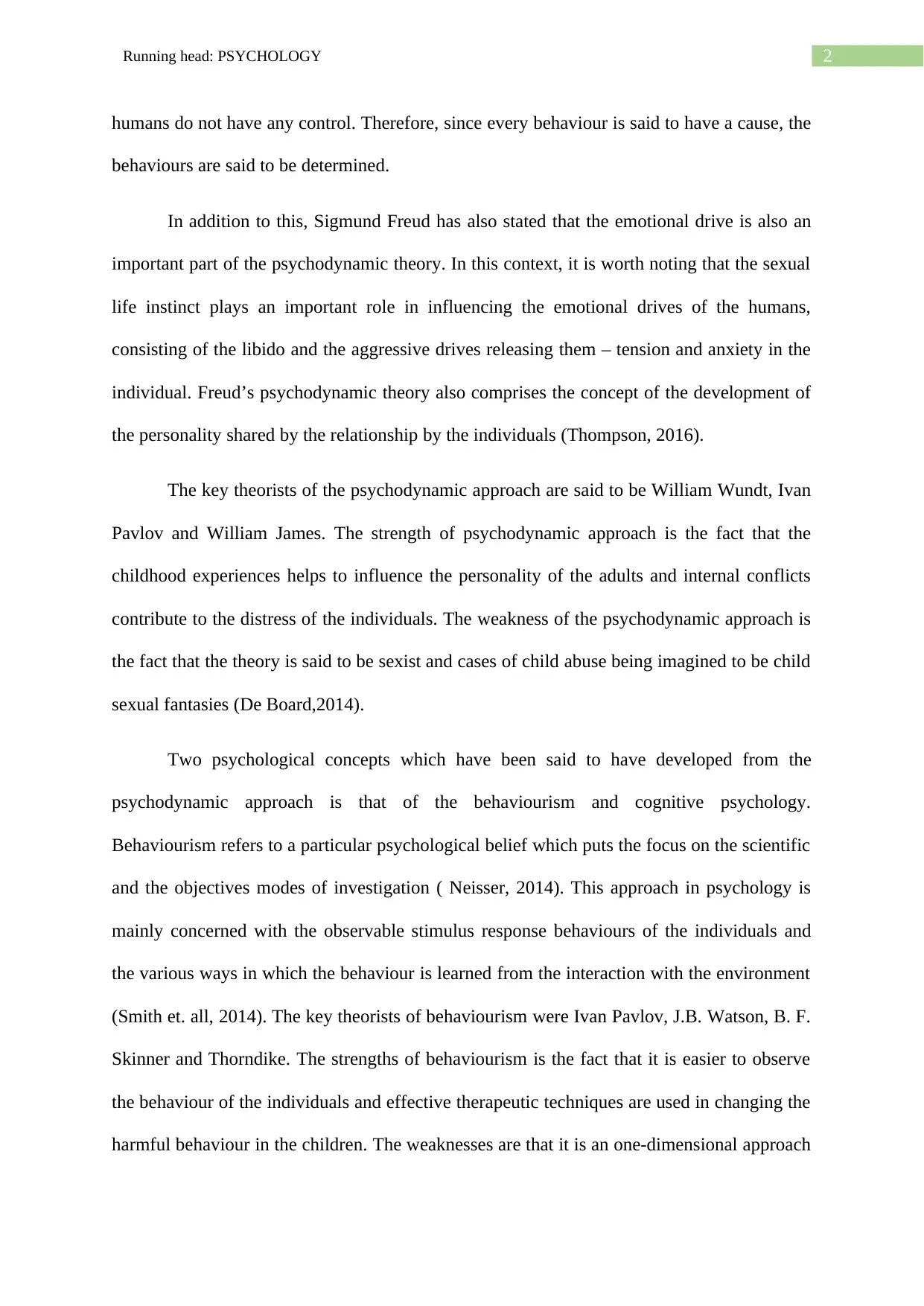
2Running head: PSYCHOLOGY
humans do not have any control. Therefore, since every behaviour is said to have a cause, the
behaviours are said to be determined.
In addition to this, Sigmund Freud has also stated that the emotional drive is also an
important part of the psychodynamic theory. In this context, it is worth noting that the sexual
life instinct plays an important role in influencing the emotional drives of the humans,
consisting of the libido and the aggressive drives releasing them – tension and anxiety in the
individual. Freud’s psychodynamic theory also comprises the concept of the development of
the personality shared by the relationship by the individuals (Thompson, 2016).
The key theorists of the psychodynamic approach are said to be William Wundt, Ivan
Pavlov and William James. The strength of psychodynamic approach is the fact that the
childhood experiences helps to influence the personality of the adults and internal conflicts
contribute to the distress of the individuals. The weakness of the psychodynamic approach is
the fact that the theory is said to be sexist and cases of child abuse being imagined to be child
sexual fantasies (De Board,2014).
Two psychological concepts which have been said to have developed from the
psychodynamic approach is that of the behaviourism and cognitive psychology.
Behaviourism refers to a particular psychological belief which puts the focus on the scientific
and the objectives modes of investigation ( Neisser, 2014). This approach in psychology is
mainly concerned with the observable stimulus response behaviours of the individuals and
the various ways in which the behaviour is learned from the interaction with the environment
(Smith et. all, 2014). The key theorists of behaviourism were Ivan Pavlov, J.B. Watson, B. F.
Skinner and Thorndike. The strengths of behaviourism is the fact that it is easier to observe
the behaviour of the individuals and effective therapeutic techniques are used in changing the
harmful behaviour in the children. The weaknesses are that it is an one-dimensional approach
humans do not have any control. Therefore, since every behaviour is said to have a cause, the
behaviours are said to be determined.
In addition to this, Sigmund Freud has also stated that the emotional drive is also an
important part of the psychodynamic theory. In this context, it is worth noting that the sexual
life instinct plays an important role in influencing the emotional drives of the humans,
consisting of the libido and the aggressive drives releasing them – tension and anxiety in the
individual. Freud’s psychodynamic theory also comprises the concept of the development of
the personality shared by the relationship by the individuals (Thompson, 2016).
The key theorists of the psychodynamic approach are said to be William Wundt, Ivan
Pavlov and William James. The strength of psychodynamic approach is the fact that the
childhood experiences helps to influence the personality of the adults and internal conflicts
contribute to the distress of the individuals. The weakness of the psychodynamic approach is
the fact that the theory is said to be sexist and cases of child abuse being imagined to be child
sexual fantasies (De Board,2014).
Two psychological concepts which have been said to have developed from the
psychodynamic approach is that of the behaviourism and cognitive psychology.
Behaviourism refers to a particular psychological belief which puts the focus on the scientific
and the objectives modes of investigation ( Neisser, 2014). This approach in psychology is
mainly concerned with the observable stimulus response behaviours of the individuals and
the various ways in which the behaviour is learned from the interaction with the environment
(Smith et. all, 2014). The key theorists of behaviourism were Ivan Pavlov, J.B. Watson, B. F.
Skinner and Thorndike. The strengths of behaviourism is the fact that it is easier to observe
the behaviour of the individuals and effective therapeutic techniques are used in changing the
harmful behaviour in the children. The weaknesses are that it is an one-dimensional approach
⊘ This is a preview!⊘
Do you want full access?
Subscribe today to unlock all pages.

Trusted by 1+ million students worldwide
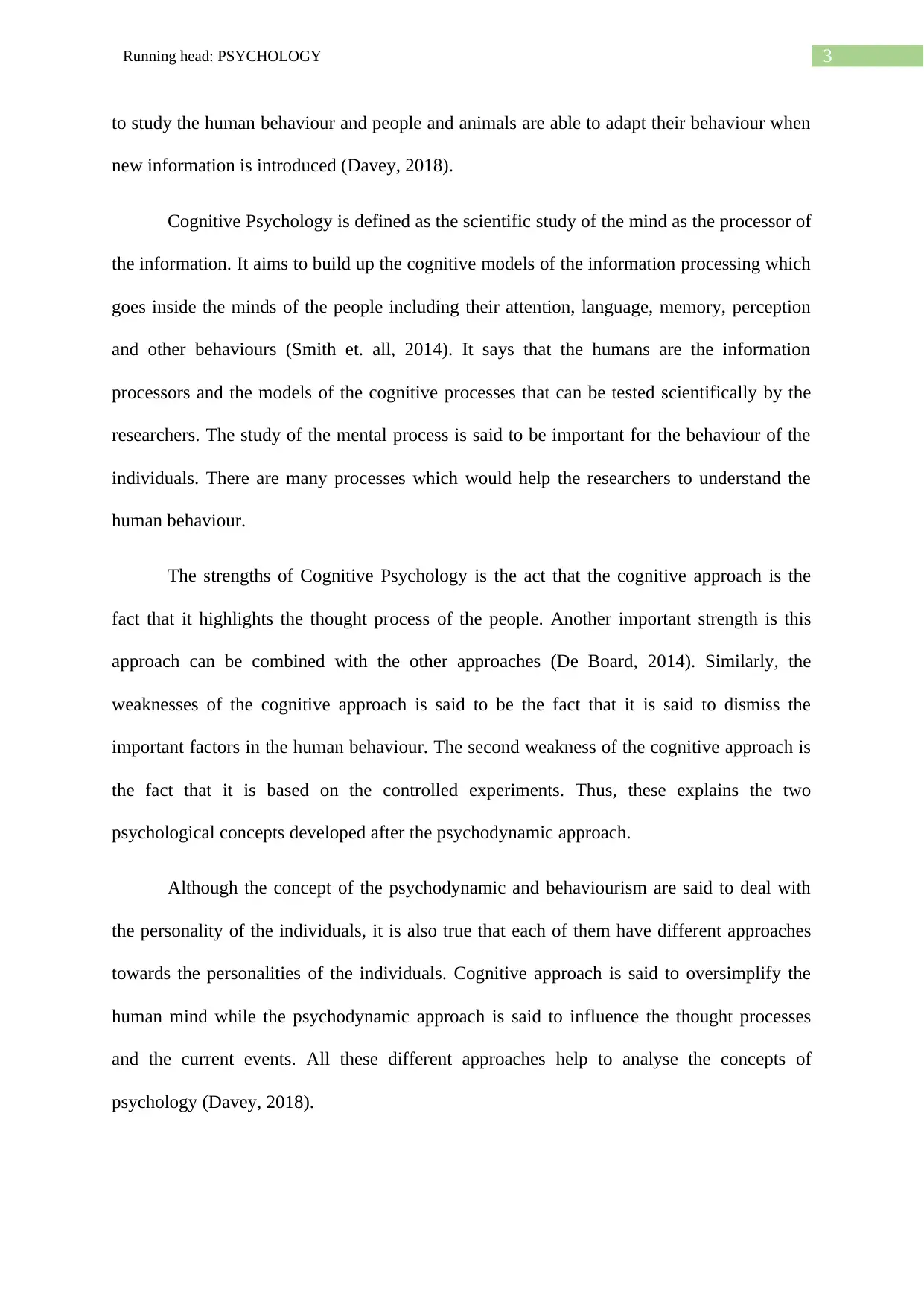
3Running head: PSYCHOLOGY
to study the human behaviour and people and animals are able to adapt their behaviour when
new information is introduced (Davey, 2018).
Cognitive Psychology is defined as the scientific study of the mind as the processor of
the information. It aims to build up the cognitive models of the information processing which
goes inside the minds of the people including their attention, language, memory, perception
and other behaviours (Smith et. all, 2014). It says that the humans are the information
processors and the models of the cognitive processes that can be tested scientifically by the
researchers. The study of the mental process is said to be important for the behaviour of the
individuals. There are many processes which would help the researchers to understand the
human behaviour.
The strengths of Cognitive Psychology is the act that the cognitive approach is the
fact that it highlights the thought process of the people. Another important strength is this
approach can be combined with the other approaches (De Board, 2014). Similarly, the
weaknesses of the cognitive approach is said to be the fact that it is said to dismiss the
important factors in the human behaviour. The second weakness of the cognitive approach is
the fact that it is based on the controlled experiments. Thus, these explains the two
psychological concepts developed after the psychodynamic approach.
Although the concept of the psychodynamic and behaviourism are said to deal with
the personality of the individuals, it is also true that each of them have different approaches
towards the personalities of the individuals. Cognitive approach is said to oversimplify the
human mind while the psychodynamic approach is said to influence the thought processes
and the current events. All these different approaches help to analyse the concepts of
psychology (Davey, 2018).
to study the human behaviour and people and animals are able to adapt their behaviour when
new information is introduced (Davey, 2018).
Cognitive Psychology is defined as the scientific study of the mind as the processor of
the information. It aims to build up the cognitive models of the information processing which
goes inside the minds of the people including their attention, language, memory, perception
and other behaviours (Smith et. all, 2014). It says that the humans are the information
processors and the models of the cognitive processes that can be tested scientifically by the
researchers. The study of the mental process is said to be important for the behaviour of the
individuals. There are many processes which would help the researchers to understand the
human behaviour.
The strengths of Cognitive Psychology is the act that the cognitive approach is the
fact that it highlights the thought process of the people. Another important strength is this
approach can be combined with the other approaches (De Board, 2014). Similarly, the
weaknesses of the cognitive approach is said to be the fact that it is said to dismiss the
important factors in the human behaviour. The second weakness of the cognitive approach is
the fact that it is based on the controlled experiments. Thus, these explains the two
psychological concepts developed after the psychodynamic approach.
Although the concept of the psychodynamic and behaviourism are said to deal with
the personality of the individuals, it is also true that each of them have different approaches
towards the personalities of the individuals. Cognitive approach is said to oversimplify the
human mind while the psychodynamic approach is said to influence the thought processes
and the current events. All these different approaches help to analyse the concepts of
psychology (Davey, 2018).
Paraphrase This Document
Need a fresh take? Get an instant paraphrase of this document with our AI Paraphraser
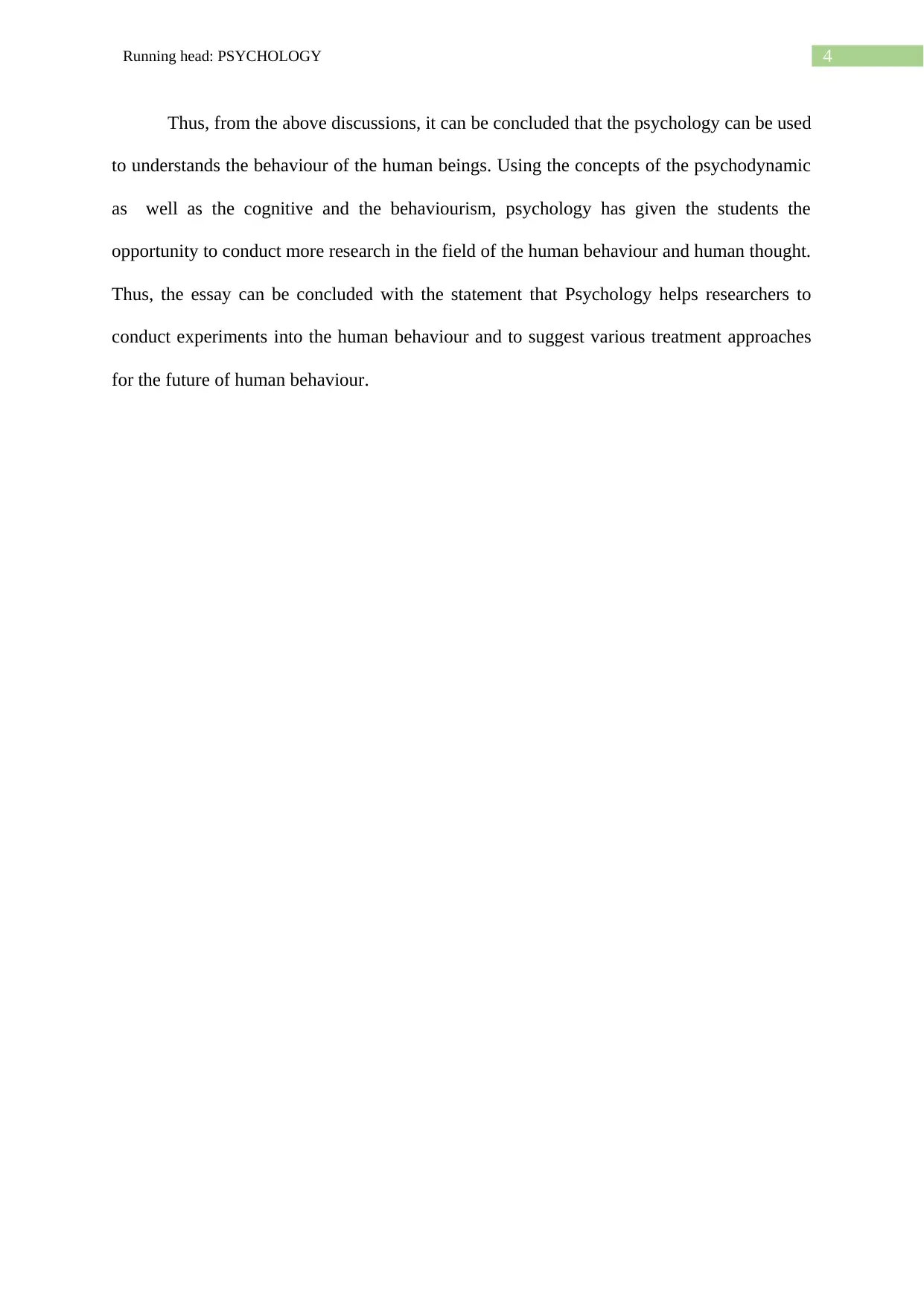
4Running head: PSYCHOLOGY
Thus, from the above discussions, it can be concluded that the psychology can be used
to understands the behaviour of the human beings. Using the concepts of the psychodynamic
as well as the cognitive and the behaviourism, psychology has given the students the
opportunity to conduct more research in the field of the human behaviour and human thought.
Thus, the essay can be concluded with the statement that Psychology helps researchers to
conduct experiments into the human behaviour and to suggest various treatment approaches
for the future of human behaviour.
Thus, from the above discussions, it can be concluded that the psychology can be used
to understands the behaviour of the human beings. Using the concepts of the psychodynamic
as well as the cognitive and the behaviourism, psychology has given the students the
opportunity to conduct more research in the field of the human behaviour and human thought.
Thus, the essay can be concluded with the statement that Psychology helps researchers to
conduct experiments into the human behaviour and to suggest various treatment approaches
for the future of human behaviour.
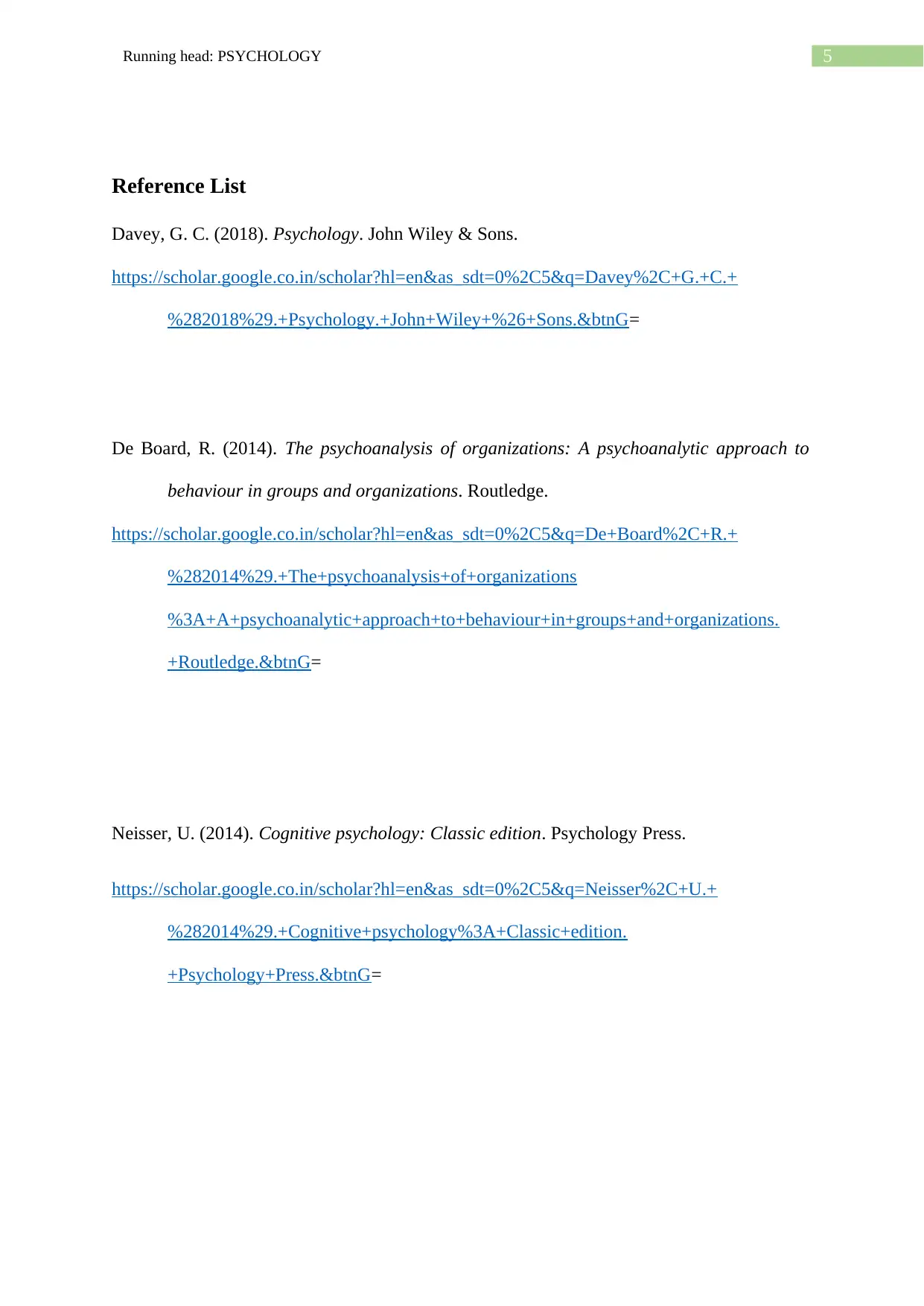
5Running head: PSYCHOLOGY
Reference List
Davey, G. C. (2018). Psychology. John Wiley & Sons.
https://scholar.google.co.in/scholar?hl=en&as_sdt=0%2C5&q=Davey%2C+G.+C.+
%282018%29.+Psychology.+John+Wiley+%26+Sons.&btnG=
De Board, R. (2014). The psychoanalysis of organizations: A psychoanalytic approach to
behaviour in groups and organizations. Routledge.
https://scholar.google.co.in/scholar?hl=en&as_sdt=0%2C5&q=De+Board%2C+R.+
%282014%29.+The+psychoanalysis+of+organizations
%3A+A+psychoanalytic+approach+to+behaviour+in+groups+and+organizations.
+Routledge.&btnG=
Neisser, U. (2014). Cognitive psychology: Classic edition. Psychology Press.
https://scholar.google.co.in/scholar?hl=en&as_sdt=0%2C5&q=Neisser%2C+U.+
%282014%29.+Cognitive+psychology%3A+Classic+edition.
+Psychology+Press.&btnG=
Reference List
Davey, G. C. (2018). Psychology. John Wiley & Sons.
https://scholar.google.co.in/scholar?hl=en&as_sdt=0%2C5&q=Davey%2C+G.+C.+
%282018%29.+Psychology.+John+Wiley+%26+Sons.&btnG=
De Board, R. (2014). The psychoanalysis of organizations: A psychoanalytic approach to
behaviour in groups and organizations. Routledge.
https://scholar.google.co.in/scholar?hl=en&as_sdt=0%2C5&q=De+Board%2C+R.+
%282014%29.+The+psychoanalysis+of+organizations
%3A+A+psychoanalytic+approach+to+behaviour+in+groups+and+organizations.
+Routledge.&btnG=
Neisser, U. (2014). Cognitive psychology: Classic edition. Psychology Press.
https://scholar.google.co.in/scholar?hl=en&as_sdt=0%2C5&q=Neisser%2C+U.+
%282014%29.+Cognitive+psychology%3A+Classic+edition.
+Psychology+Press.&btnG=
⊘ This is a preview!⊘
Do you want full access?
Subscribe today to unlock all pages.

Trusted by 1+ million students worldwide
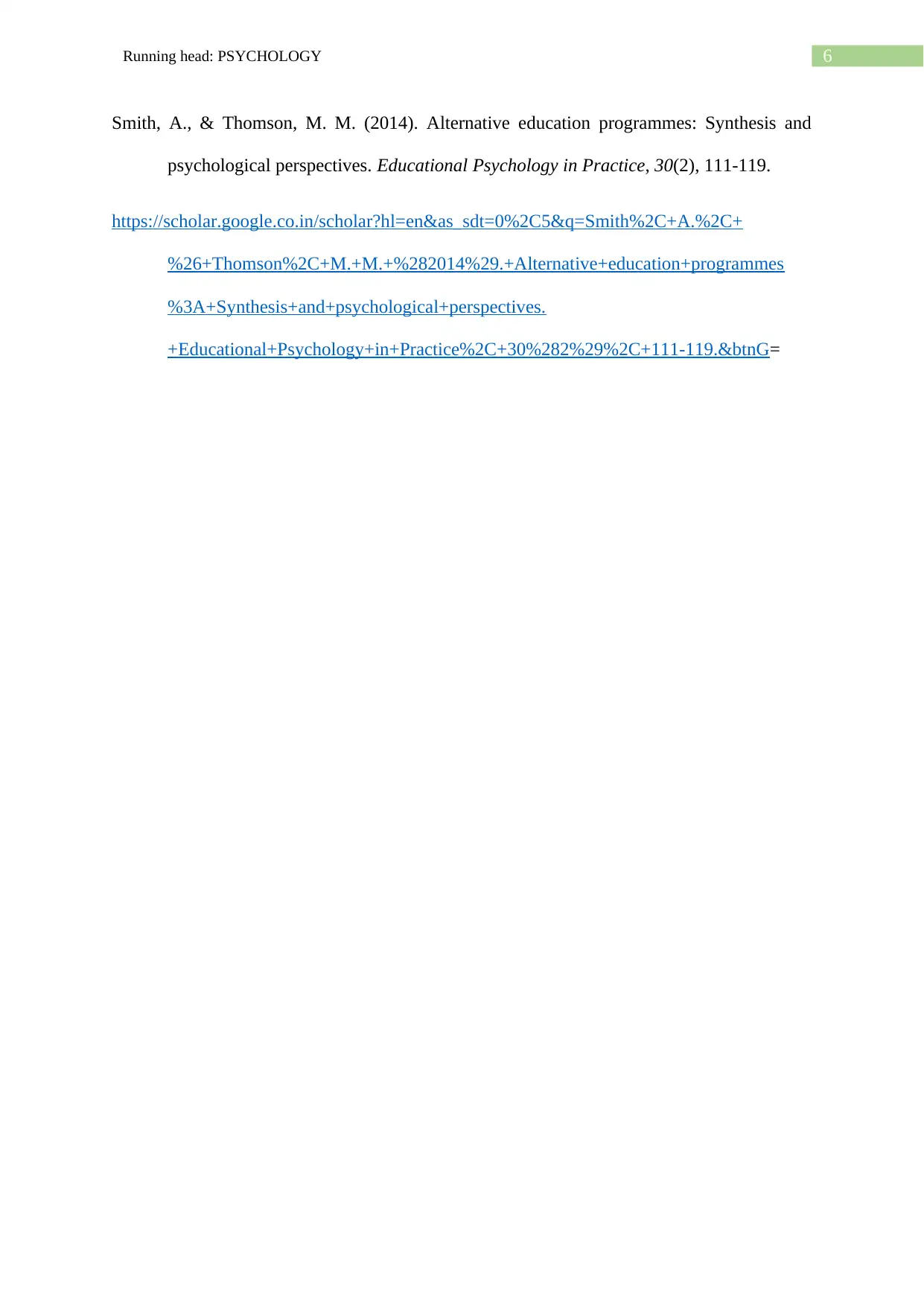
6Running head: PSYCHOLOGY
Smith, A., & Thomson, M. M. (2014). Alternative education programmes: Synthesis and
psychological perspectives. Educational Psychology in Practice, 30(2), 111-119.
https://scholar.google.co.in/scholar?hl=en&as_sdt=0%2C5&q=Smith%2C+A.%2C+
%26+Thomson%2C+M.+M.+%282014%29.+Alternative+education+programmes
%3A+Synthesis+and+psychological+perspectives.
+Educational+Psychology+in+Practice%2C+30%282%29%2C+111-119.&btnG=
Smith, A., & Thomson, M. M. (2014). Alternative education programmes: Synthesis and
psychological perspectives. Educational Psychology in Practice, 30(2), 111-119.
https://scholar.google.co.in/scholar?hl=en&as_sdt=0%2C5&q=Smith%2C+A.%2C+
%26+Thomson%2C+M.+M.+%282014%29.+Alternative+education+programmes
%3A+Synthesis+and+psychological+perspectives.
+Educational+Psychology+in+Practice%2C+30%282%29%2C+111-119.&btnG=
1 out of 7
Related Documents
Your All-in-One AI-Powered Toolkit for Academic Success.
+13062052269
info@desklib.com
Available 24*7 on WhatsApp / Email
![[object Object]](/_next/static/media/star-bottom.7253800d.svg)
Unlock your academic potential
Copyright © 2020–2026 A2Z Services. All Rights Reserved. Developed and managed by ZUCOL.





